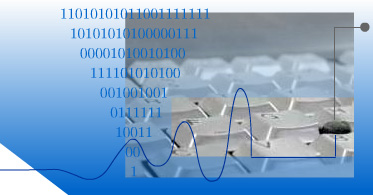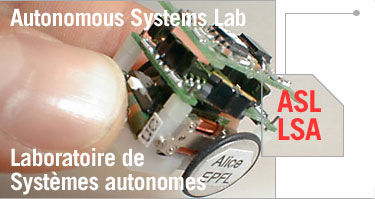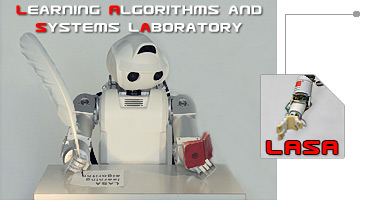Address
NCCR IM2
c/o Idiap
Centre du Parc
Rue Marconi 19
Case Postale 592
CH-1920 Martigny
Switzerland
tel. +41 27 721 77 11
fax +41 27 721 77 12

|
Phase I and II
|
Idiap (LEADING HOUSE)
Idiap is an independent non-profit research institute located in Martigny, Valais, and affiliated with the "Ecole Polytechnique Fédérale de Lausanne" EPFL, and the University of Geneva. Idiap carries out research in the areas of Speech Processing, Computer Vision, Information Retrieval, Biometric Authentication, Multimodal Interaction and Machine Learning.
(Prof. H. Bourlard, Dr J. Dines, Prof. J. del R. Millán, Dr Andrei Popescu-Belis) |
 |
Multimedia Signal Processing Group, EPFL
The group is active in research and teaching in the field of multimedia signal processing. The research topics span through four highly interconnected disciplines of multimedia signal processing, namely multimedia coding, processing, security, as well as multimodal interfacing. Multimedia coding includes still image, video and 3D model compression.
(Prof. Touradj Ebrahimi) |
 |
ITS - Signal Processing Institute, EPFL
The Signal Processing Institute (ITS) brings together researchers working at the interface between several signal modalities. The expertise of the lab ranges from digital signal processing to integrated systems design. The main topics investigated are biomedical signal/image processing,computer vision, data compression, media delivery, etc
(Prof. J-P. Thiran, Prof. P. Frossard) |
 |
ASL - Autonomous Systems Lab, ETHZ
The ASL research is at core interdisciplinary, building a bridge between Engineering, Computer Sciences and Biology combining a wide range of Engineering and Signal Processing methods for the development of adaptive control systems to enable flexible human-robot interactions.
(Prof. R. Siegwart) |
 |
LASA - Learning Algorithms and Systems Laboratory, EPFL
Fields covered at LASA include: Learning and Dynamical Systems, Neural Computation and Modeling, Human-Machine Interaction, Humanoids Robotics, Mechatronics, Design of Therapeutic and Educational Robotic Systems.
(Prof. A. Billard) |
 |
LIA, EPFL
The Artificial Intelligence Laboratory (LIA) is part of the Institute of Core Computing Science in the School of Computer and Communication Sciences at the Swiss Federal Institute of Technology in Lausanne (EPFL). The ongoing research actives at the LIA include the application of techniques such as constraint optimization and satisfaction, intelligent agents and natural language processing to fields like resource allocation, design, configuration or knowledge extraction.
(Dr M. Rajman) |
 |
VIPER, University of Geneva
The VIPER group of research deal with the processing and management of multimedia. In particular, the research is focused on multimedia information retrieval and organisation
(Prof. T.Pun, Dr S. Marchand-Maillet) |
 |
ISSCO, University of Geneva
ISSCO, originally the "Dalle Molle Institute for Semantic and Cognitive Studies", is now a research group which is part of the School of Translation and Interpretation (ETI) / Multilingual Information Processing Unit (TIM), at the University of Geneva. We carry out work in the field of natural language processing (NLP).
(Prof. S. Armstrong, Dr A. Popescu-Belis) |
 |
The Neurology Department of the Geneva University Hospital
The Neurology Department of the Geneva University Hospital (HUG) provides evaluation and services for patients with neurological conditions as well as the necessary infrastructure to carry out efficient multidisciplinary investigations. Our Electrical Neuroimaging Group (ENG) is involved in the developments of methods for the study of physiological signals (EEG, EKG, etc) and their application in clinics and basic research.
(Dr. Sara Gonzalez) |
 |
DIVA, University of Fribourg
The DIVA research group (Document, Image and Voice Analysis) is dealing with multimedia engineering, with a focus on image and signal processing, speech recognition and document analysis. More than half of the research activity is financed by external grants, from public institutions as well as from industrial partners.
(Prof. R. Ingold) |
DIVA |
Computer Vision Laboratory, ETH Zurich
The Computer Vision Laboratory, ETH Zurich, works on the computer-based interpretation of 2D and 3D image data sets from conventional and non-conventional image sources. We perform research in the fields of Medical Image Analysis and Visualization, Shape Modeling and Visualization, and Remote Sensing.
(prof. L. van Gool) |
|

 |
TIK, ETHZ
The speech processing group was founded in 1976 at the Laboratory of Applied Physics. In 1991 the group became a part of the Computer Engineering and Networks Laboratory (the laboratory's German acronym TIK stands for: Institut für Technische Informatik und Kommunikationsnetze).
(prof. B. Pfister) |
 |
ICSI, International computer science institute, Berkeley
ICSI currently has significant efforts in four major research areas: Internet research, including Internet architecture and related theoretical questions; theoretical computer science, including applications to bioinformatics; artificial intelligence, particularly for applications to natural language understanding; and natural speech processing. The areas of concentration are chosen for their fundamental importance and their compatibility with the strengths of the Institute and UC Berkeley faculty.
(prof. N. Morgan) |
 |
|
Last modified
2011-03-18 16:15
|
|
